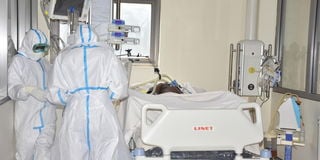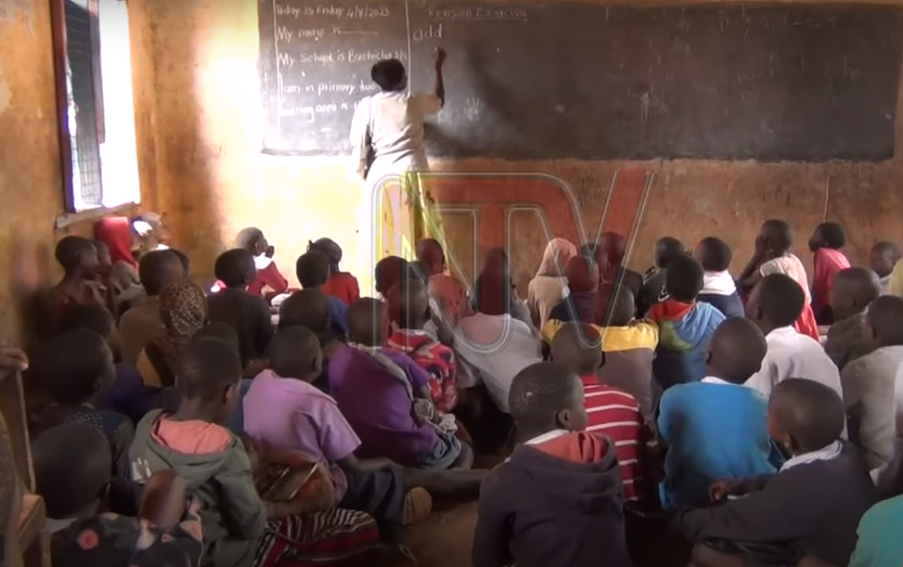Covid admissions reduce by half

A Covid-19 patient in ICU at Mualgo National Referral Hospital. PHOTO/FILE
What you need to know:
- Officials attribute the lower infections to lockdown, but other health experts say such gains are not sustainable unless the government ramps up immunisation.
Covid hospitalisation numbers have dropped almost by half to 620, from the second pre-second lockdown pandemic rates that overwhelmed medical facilities and left patients choking on insufficient medical oxygen.
June 26 data shows a reduction in the numbers of Covid in-patients by 11, although it remains unclear those who recovered were discharged or lost the battle.
Health ministry officials have singled the remarkable lower infections, hospital admissions and deaths as lockdown-linked successes, while other health experts said such gains are not sustainable unless the government ramps up immunisation.
The country, after beating back the first wave of coronavirus and emerging less scathed compared to even developed nations, plunged into a more lethal phase of the disease with daily hospital admission of patients with Covid surpassing 1,000 between May 24 and July 6, before daily admission dropped to triple digits.
Under home-care
Officials said at least 10,093 other mild-case patients are being managed at homes, a dramatic reduction over the weeks when the sudden post-election surge sparked panic and counter-blame game between government officials and citizens.
Our breakdown of Health ministry data shows that Mulago National Referral Hospital has 54 Covid patients, Entebbe Grade B has 24 cases while Soroti Regional Referral Hospital in the east has the highest Covid in-patients, 58.
Mbale Regional Referral Hospital has 39 cases, Jinja Regional Referral Hospital 34 while 35 Covid patients are being managed at Arua Regional Referral Hospital in West Nile.
Among the private health facilities, TMR International Hospital in the city’s Naalya suburb has the largest number with 37 Covid admissions, while Case Medical Centre comes second with 16 cases and UMC Victoria Hospital has 14 cases.
Dr Rosemary Byanyima, the deputy director of Mulago National Referral Hospital, yesterday said the reduction of Covid patient numbers to 54 is an indicator that they have managed the pandemic well.
“We used to manage 200 cases daily, but now we only have 54. So, this number is nothing to us because we have a bigger capacity,” she said.
Officials from the different regional referral hospitals, where severe cases are admitted, say their work is being hampered by lack of enough trained critical healthcare givers, compromising their capacity.
A number of Intensive Care Units have remained inactive because there are no specialists to operate the equipment.
At Lira Regional Referral Hospital, the treatment centre has a total of 47 active cases with cumulative death of 40 since the second lockdown, which ended yesterday.
Dr Stephen Obbo, the hospital director, said their efforts are being hampered by lack of specialists, and that their ICU operates as an High Dependency Unit (HDU) because there are no anesthesiologists and critical care nurses to operationalise the machines.
“Despite the fact that we have been training some staff, there is still a gap, especially as far as our specialised doctors are concerned. It has necessitated referral of some patients more than 300 kilometres to Kampala.
The impaired Lira ICU was planned to serve the neighbouring Kole, Oyam, Apac, Kwania, Dokolo, Amolatar, Alebtong, and Otuke districts.
In Buikwe District, 32 Covid patients remain in admission at Kawolo and Nyenga Hospitals, with no severe cases reported.
In Jinja, the district health officer, Dr Dyogo Nantamu, said Covid-19 cases have reduced compared to the beginning of the ended 42-day lockdown.
“At the beginning of the lockdown, we were getting 100 new cases on a daily basis, but we are getting 10 new cases per day in Jinja. The current total number of patients is 34,” he added.
Mr Dyogo said they have been using mainly the home-based care system because of inadequate medical supply and food in the hospital.
“We have been sending those who are not in severe condition home because of inadequate medical supply and food, but isolation at home has been a challenge because some households can’t afford separate rooms. Inadequate oxygen and beds are also a challenge in treating Covid -19 patients,’’ he said.
Mr Robert Luvaluka, the Jinja surveillance focal person, said the number of Covid-19 patients who are under home-based care stands at 95.
“As of June1 to 27 of July, we had 1,029 patients who have been undergoing home-based treatment … the number has kept reducing because people have observed the standard operating procedures (SOPs) and vaccination issue,’’ he said.
Mr Luvaluka said it has been a challenge for patients to buy some drugs, which are not on the government essential list.
“The prices of drugs such as Azithromycin have been hiked from Shs4,000 to Shs15,000, Vitamin C from Shs5,000, full pack of 100 tablets to Shs15,000, some end up failing to buy the prescribed drugs because they are financially unable,’’ he said.
In Nakaseke, the district general hospital has 14 Covid-19 patients in admission, senior administrator Matovu Ntumwa said.
Elsewhere at Gulu Regional Referral Hospital, Dr Paska Apio, the head of Covid-19 Case Management, told Daily Monitor that they have 10 active cases, and the demand for oxygen has correspondingly reduced from last month’s highs.
She, however, added that the number of active cases under home-based care has risen following a decision they took to only admit persons with severe cases.
“We have 120 active cases under home-based care, and we are following them closely. Since June, we have registered more than 566 Covid-19 patients under home-based care,” Dr Apio added.
She, however, warned against celebrating the reduced Covid infections and deaths in the country, and implored the population not to become complacent because the cases could explode again once movement restriction is lifted.
“The number of people coming for testing has reduced compared to the previous [times] because of movement challenges, so when we relax now, we might see the third wave and this time it might be worse than the second,” she said.
Private health facilities
A number of private health facilities across the country were also accredited to treat Covid-19 and they combined have 123 patients as of Tuesday.
The facilities offer non-Invasive mechanical ventilation, invasive mechanical ventilation, high flow oxygen therapy, High Dependency Unit and Intensive Care Unit.
The Association of Anesthesiologists of Uganda that created a dashboard for Covid-19 ICU beds, said the pandemic has brought about a greater need for hospital services, especially intensive care, and that while intensive care is being provided, the overwhelming demand has caused a stretch on the available beds across the region.
Among the private health facilities, Nakasero Hospital has 11 ICUs, Kampala Hospital 4, International Hospital Kampala 6, Medipal International Hospital 6, TMR International Hospital 37 and Case Medical Centre 6.
Others include Norvik Hospital with 5 beds available, Platinum Hospital 4, Mengo Hospital 4, Nsambya Hospital 4, Rubaga Hospital 2 and UMC Victoria Hospital 14.
COVID ADMISSIONS ACROSS THE COUNTRY
NO | Hospital | HDU | ICU | TOTAL |
1 | Nakasero hospital ltd | 7 | 4 | 11 |
2 | Kampala hospital ltd | 4 | 4 | |
3 | International Hospital Kampala | 3 | 2 | 3 |
4 | Medipal International Hospital | 6 | 6 | |
5 | TMR International Hospital | 24 | 13 | 37 |
6 | Case medical centre | 6 | 16 | |
7 | Norvik Hospital | 5 | 5 | |
8 | Platinum hospital | 4 | 4 | |
9 | Mengo Hospital | 4 | 4 | |
10 | Nsambya hospital | 4 | 4 | |
11 | Rubaga Hospital | 3 | 3 | |
12 | UMC Victoria Hospital | 7 | 7 | 14 |
13 | Lacor Hospital | 9 | 4 | 13 |
14 | Mulago NRH | 47 | 7 | 54 |
15 | Naguru NRH | NA | NA | NA |
16 | Entebbe GBH | 23 | 5 | 28 |
17 | Arua RRF | 35 | 35 | |
18 | Gulu RRF | 10 | 10 | |
19 | Lira RRF | 14 | 14 | |
20 | Moroto RRF | 4 | 4 | |
21 | Soroti RRF | 58 | 58 | |
22 | Mbale RRF | 32 | 5 | 39 |
23 | Jinja RRF | 34 | 34 | |
24 | Nakaseke | 14 | 14 | |
25 | Masaka RRF | NA | NA | NA |
26 | Mbarara RRF | 25 | 25 | |
27 | Kabale RRF | NA | NA | NA |
28 | Fort Portal RRF | 17 | 10 | 27 |
By Franklin Draku, Tausi Nakato, Dan Wandera, Isaac Otwii, Derrick Kissa, Felix Warom, Fred Wambede, Caroline Ayugi, Stephen Ariong, Felix Ainebyoona, Simon Emwamu & Polycarp Kalokwera




